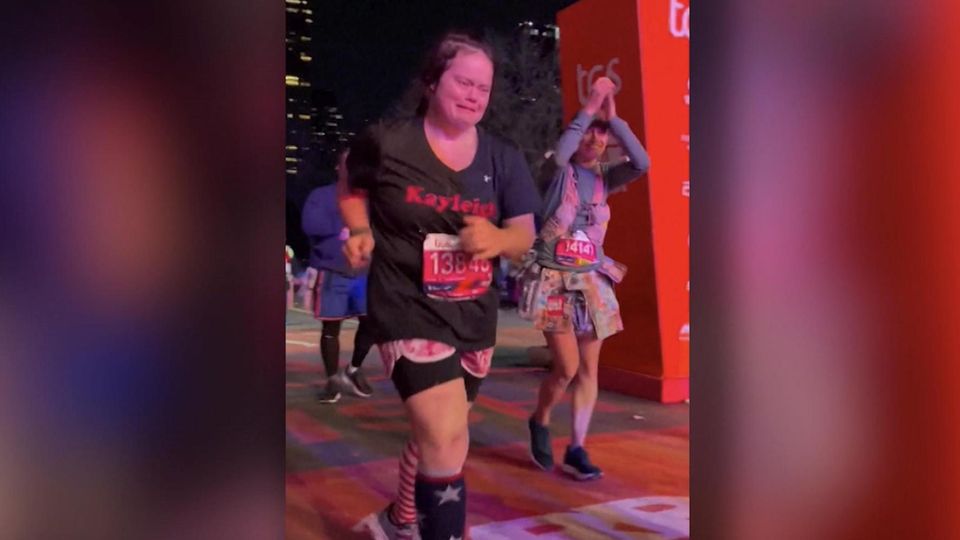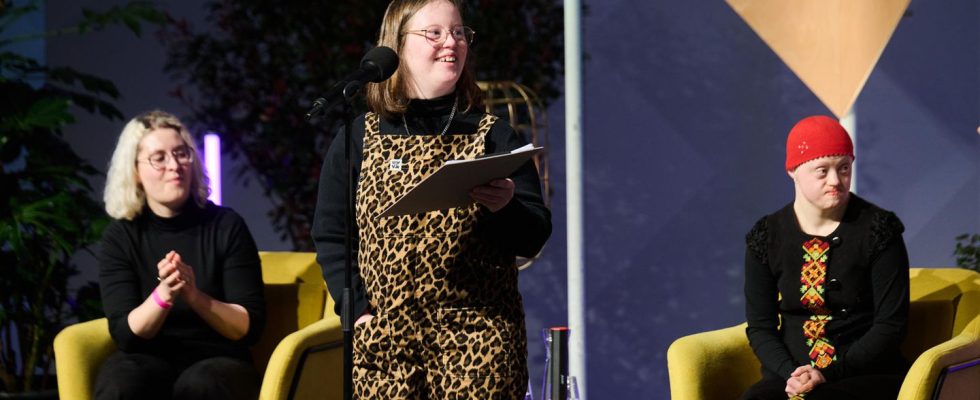March 21st is World Down Syndrome Day. In Germany, up to 50,000 people live with trisomy 21. How people talk about them and how they want to describe themselves is always up for debate.
What you are called in society has something to do with respect. People with Down syndrome don’t always recognize it in those around them. It starts with the salutation: They are often called by the nickname, while others expect to be addressed, say members of the “Ohrenkuss” editorial team. The cultural magazine based in Bonn is something special: the people who write there have trisomy 21, also known as Down syndrome.
An author tells how, regardless of her age, she is always handed a slice of sausage at the counter. She defended herself against this: it was enough that she wasn’t a child, she said. Thursday (March 21st) is World Down Syndrome Day. Events around the world will then increase public awareness of the issue.
What does trisomy 21 mean?
Trisomy 21 is due to a peculiarity in the genetic makeup: chromosome 21 is present three times instead of the usual two. This has consequences for both mental and physical development. As the mother gets older, the likelihood of the child having trisomy 21 increases. Examinations during pregnancy can predict whether a child will grow up with Down syndrome. After such a prenatal diagnosis, a large proportion of expectant mothers do not carry the child to term.
In Germany there is no register for people with the syndrome – depending on estimates, between 40,000 and 50,000 people with trisomy 21 currently live in the Federal Republic.
Certain diseases are more common in people with Down syndrome than in the general population. These include congenital malformations, especially heart defects. People also have intellectual disabilities, which vary greatly from person to person. Those affected are often socially intelligent and empathetic.
“People with…”
The online meeting of the “Ohrenkuss” editorial team at the end of February is somewhat loaded. The members discuss in front of their monitors what they want to be called in society. Should the term “people with intellectual disabilities” be replaced by “people with intellectual (or cognitive) impairment”? The former is offensive, they say. The federal government, among others, also uses the second formulation.

The “Ohrenkuss” team doesn’t like either of the two terms. “People with cognitive impairment” means “that we are mentally ill and not so quick,” says Theresa Knopp. “But as I know ‘Ear Kiss’, we think very quickly and also write a lot.” She describes herself as an activist. During the day Knopp works in the kitchen of a kindergarten.
Looking for the best formulation for Down syndrome
Many people find the term “people with Down syndrome” to be unproblematic. There is disagreement about the extent to which they should be called “people with intellectual disabilities.” The Federal Commissioner for the Issues of People with Disabilities, Jürgen Dusel (SPD), does not want to use the term, “since the people who are called that reject it because they find it discriminatory and hurtful,” he says. Describing someone as “intellectually impaired” comes from the United Nations Convention on the Rights of Persons with Disabilities.
7 pictures
Dusel criticizes the fact that the term mental disability is still used in statute books. Together with the self-advocacy organization “MenschFirst”, a process was initiated to jointly search for a term that the affected group would find valuable. They prefer the term “people with learning difficulties”.
The “Ohrenkuss” team doesn’t think that’s perfect either. At the end of the online session there is a half-hearted agreement for “people with different learning opportunities”. The aim is to avoid deficits or defects as part of the designations in order to prevent discrimination. “The perspective is shaped when I only look at deficits and only look for them,” emphasizes Katja de Bragança, human geneticist and founder of “Ohrenkuss”.
But why looking at the deficit can also be important
Dusel points out the legal aspect of such terms: Anyone who has a disability or impairment receives, among other things, compensation for disadvantages in the form of tax breaks, separate parking spaces or cheaper bus and train tickets. It is therefore an advantage to also name the disadvantage. “It’s of no use to us if we gloss things over with language and turn people with disabilities into people with special challenges,” says the Federal Commissioner, who himself has a visual impairment. “It doesn’t matter to me whether you talk about people with disabilities or disabled people, the main thing is that people are in the foreground and people treat each other with respect.”
Elzbieta Szczebak, head of the German Down Syndrome Infocenter, agrees with Dusel. It would be desirable to talk about people with different learning abilities instead of always emphasizing the negative. “If we thought like that, we would remove a hurdle and perhaps there would be fewer prejudices about people,” says the philologist. But it is also important that financial compensation for disadvantages should not be lost if one claims that everyone can do everything.
For Anna-Lisa Plettenberg from “Ohrenkuss” it is very difficult to talk about her own name. The topic is very emotional, she says. Like many of her colleagues, the magazine’s long-time author advocates for “people with equal rights”.
It was a difficult but exciting “ear-kissing” session, according to those in the group. Johanna von Schönfeld didn’t find it particularly pleasant because of the topic. “But I’m toughened up,” she says. There was also a lot of talk about inclusion at school. “I’m a funny Rhinelander and I create my own world.” She emphasizes: She is happy to be normal, to be human.

